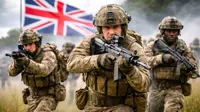There is more to security than just guards
By Usha Somayaji | 01 Jun 2001
If you thought providing security meant just hiring any unemployed person, fitting him into a uniform and stationing him at the gate, think again!
Today, offering security solutions means a whole lot more. Apart from the ubiquitous uniformed guard you see manning every main doorway, there's a legion of security needs such as combating industrial espionage, copyright and IPR infringement protection, event security management, and even executive protection. So much so, security has become more of a science than mere physical protection, as Topsgrup, the "total security solutions company", claims.
Topsgrup, which specialises in corporate and industrial security, is into marine patrolling service, which involves protecting the communication cables running across the seabed. The company is also in the process of introducing a countrywide radio trunk networking service, and setting up intricate electronics surveillance in industrial and commercial establishments. Even investigating competitive malpractice and industrial espionage, spurious product introduction, and copyright infringement of software and media products are part of the company’s activity list.
Not content with such a wide array of services, it plans to take on some more! On the cards are corporate security training, and cash management services, where it sees a major market. The latter is big business given the spread of automatic teller machines (ATMs) across the country.
"Earlier we thought that cash management services meant transferring cash from one location to another. Today it means a whole lot more, with the installation of ATMs across the country. Besides providing the physical security, it also means understanding the complex technology of the ATMs, replenishing cash, accounting for it, understanding the codes, and changing cassettes. Above all, you need to build up a high degree of credibility," says Aneel Khanna, chief operating officer of Topsgrup.
Cash management services will also extend into supermarkets and other chain stores, as also precious cargo transportation, such as bullion and diamonds. To gear up to the task, the company proposes to acquire the appropriate capability, including equipment, armoured vehicles and technology.
In order to equip itself better to handle such high technology security, the company plans to enter into collaboration with an overseas organisation. The collaboration could be a technical one, or even a joint venture, the details of which are yet to be finalised.
The other area where Topsgrup plans to branch out is into corporate security training. "It is not the responsibility of the security staff alone to maintain the security of the organisation. The company's staff are equally responsible, and need to be trained for it, especially in the event of an emergency such as fire", says Mr. Khanna. Training would involve evacuation drills, fire fighting, installing of systems and panic diffusing measures, as also personal protection in hazardous zones.
While the income derived from this activity may not be large -- estimated at around Rs 1.5 crore -- what Topsgrup is banking on is the consequent build up of its brand in industrial circles, where it already has a 3,000 strong clientele.
In terms of physical expansion, it will extend the branch expansion activity which it began last year, to cover 85 cities by March 2002, from 79 at present. All these measures will take it to the Rs 100 crore mark by 2002, from the present Rs 52 crore turnover, says Mr. Khanna. The final objective is to turn into a global player, extending its activities beyond the country's boundaries, and get publicly listed.
These are the Topsgrup goals, as far as corporate objectives go. What really irks the company is the absence of 'industry' status for the security business, and this, Mr. Khanna says, needs to be changed.
There are many grouses, most of which are relevant. "Banks don't look at us," says Mr. Khanna, listing the most important. Typical security agencies have cash flow needs where payments in the form of wages have to be made in the beginning of the month, while cash inflows occur only after the middle of the month. There are other obligations such as PF and ESI payout, which have to be met in the first half of every month. "We need to fill in this gap, but banks are not forthcoming, since security is not considered an industry," points out Mr. Khanna.
Besides, with the high technology security needs of the day, security companies need to equip themselves with the right infrastructure and expertise, which call for timely investments. Financing is a major issue, but there are others. "As an industry, we can get legal empowerment, which is lacking," says Mr. Khanna. This would include license to hold arms, and arrest, when necessary.
Topsgrup, in its bid to achieve industry status for the sector, has begun by setting its own house in order. "We have begun by formalising and professionalising our own activities and adopting ISO systems into our working." The company has obtained ISO certification. It has also initiated steps to revamp the Security Agencies Association, moving towards self-regulation, and involving in citizen protection groups along with the state police to monitor residential belts.
Considering that this sector is largely unorganised, with only a handful of organised players -- most of them being regional, only two, Group Four and Topsgrup being the national players --the task a complex one. But, says Mr. Khanna, security is a vital need, and this sector is a significant employer, employing over 10 lakh people. The security market is worth Rs 1,500 crore, and growing at the rate of 20 per cent, annually. Hence, the need for an industry status, which will give it legitimacy, and with it, regulation.
"Today, one associates the security business with physical security. The need is for much beyond that," says Mr. Khanna.

















